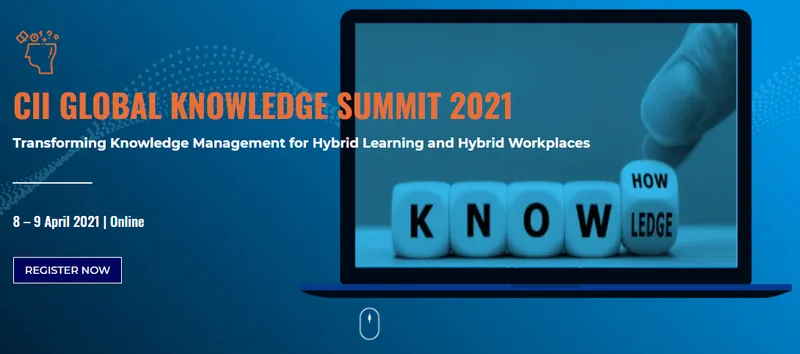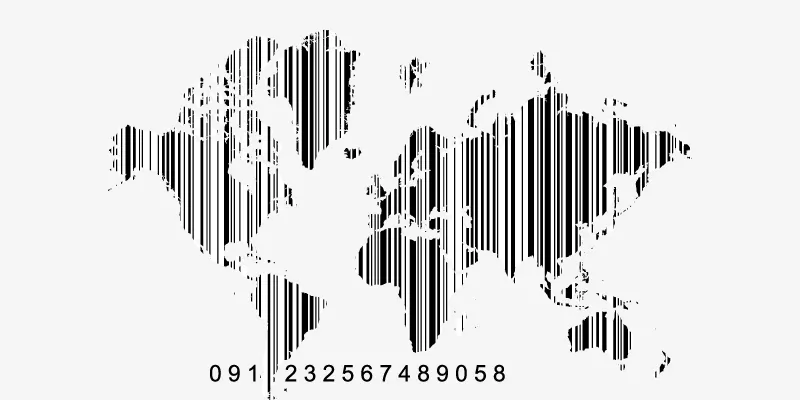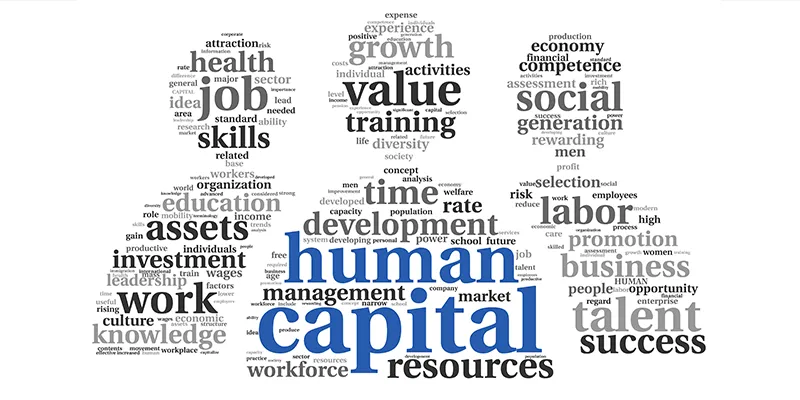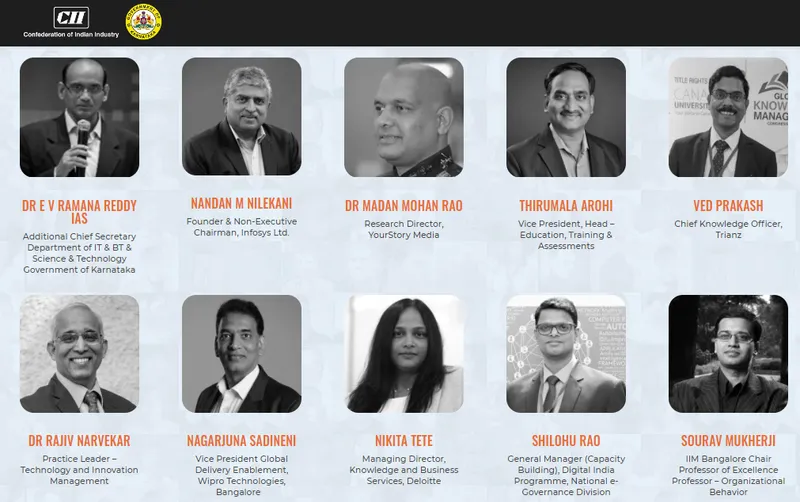CII’s annual Global Knowledge Summit is being held entirely online on April 8-9 this year. The theme of the 16th summit is Transforming Knowledge Management for Hybrid Learning and Hybrid Workplaces.
As the media partner for the Knowledge Summits, see YourStory’s coverage of the editions from 2021, 2020 and 2019, and sessions takeaways from the Bangalore K-Community meetups.
See also our profiles of MIKE (Most Innovative Knowledge Enterprise) award winners EY, Tata Steel, Cognizant Technology Solutions, Afcons Infrastructure, Petroleum Development Oman, BINUS University, and Mobarakeh Steel Company.
In this preview article, we present insights from speakers, organisers, and members of the partner organisation, Knowledge Management Global Network (KMGN).

KM impacts
Over the past few decades, the discipline of knowledge management (KM) is increasingly manifesting through communities of practice, enterprise portals, and organisational learning. Sujit Sahoo, VP of Human Capital, Trianz, cites several cases of the business impact of KM.
“Trianz has created an entirely new portfolio of offerings and solutions in cloud, analytics, digital, and infrastructure. This was possible due to better knowledge sharing and collaboration across different practices,” he explains, in a chat with YourStory. Almost all the new logos in the last 12 months have come thanks to this refreshed Trianz portfolio.
“TCS has doubled the number of $100 million accounts over last five years through account mining, primarily because of contextual knowledge on the account being available through KM,” Sujit adds.
For a large multi-year deal at Trianz, the cost of managing the application and infrastructure has reduced 10 percent year-on-year because of KM interventions. This was due to structured reuse in development and the KEDB (Known Error Database) in support, according to Sujit.
A combination of human-centred approaches, continual process improvement, and digital mindset has supported KM practices in organisations, according to Shilohu Rao, General Manager (Capacity Building), Digital India Programme, National e-Governance Division (NeGD).
The organisation has developed capacity-building programmes to enhance the cybercrime tackling skills of judicial, police, and other law-enforcement officers. “The success of the programme is based on experiential learning as part of the training,” he adds.

Digital skillsets
To succeed in digital transformation, a range of skills will be needed at multiple levels in the organisation, according to Vincent Ribière, Managing Director and Co-Founder of the Institute for Knowledge and Innovation Southeast Asia (IKI-SEA), Bangkok.
At the strategic level, what is needed is a growth mindset, digital know-how, and data-driven focus. “Networking, empathy, ethics, and agility are also important,” he adds. Some of these are spelt out in his recent co-authored paper in the Business Horizons Journal, titled ‘Will AI ever sit at the C-Suite table? The future of senior leadership’.
For other levels, Vincent highlights analytical and creative thinking, active learning (and unlearning), and social and emotional skills.
“Strange as it may sound, one of the key skills to succeed in a hybrid workplace shaped by digital transformation is commitment. Now, more than ever, your colleagues must be able to feel your commitment to the team, to the goals, and to your personal success,” observes Rudolf D’Souza, Chief Knowledge Officer, Afcons Infrastructure.
Commitment helps build trust in environments where there is the absence of physical presence. Rudolf says he personally witnessed this in team and client interactions during the pandemic lockdowns.
“Another key factor is stepping up to be counted. Digital has created disintermediation of the organisational hierarchy, and everyone’s contribution is visible,” he adds.
As old ways of working have changed, creativity and innovation are also needed to adapt, experiment and pivot. “Use your imagination to run safe-to-fail trials. At Afcons, we experimented with whole-organisation learning – something new to us, with great success,” Rudolf recalls.
Collaboration, creativity, and trans- or inter-disciplinary thinking are the key skills identified by Shilohu of NeGD.
Sujit of Trianz also identifies three key skills in this regard: agility, learnability, and simplification. Employees need to be flexible and ready to accept change and react to it. They will need continuous re-skilling, and learn how to make things less complicated.

KM and AI
The role of KM is being transformed in a world of increasing AI, ML, and automation. “KM plays an important role in identifying opportunities for application of knowledge that feeds into AI, automation and machines,” Sujit of Trianz observes.
“KM can also help not to repeat the failures of history. With disparate sources of knowledge, both internal and external, KM plays a vital role in building that foundation,” he adds.
AI and automation will become particularly important in areas like cybercrime investigation, according to Shilohu of NeGD. Human experts will need capacity-building in trans-disciplinary areas, and humans and machines will collaborate extensively.
Vincent of IKI-SEA expects a closer relationship/collaboration between AI and KM teams. “In the past, they have been mainly working independently. Now the time has come to co-design and co-develop intelligent solutions for better and faster decisions,” he observes.
Rudolf of Afcons foresees an evolution of three types of workers. “Highly intelligent and creative workers will be in great demand, but will be in the minority. The middle layer will develop the AI logic. Lower-end workers will install machines and sensors, and there will be many of these jobs,” he predicts.
Some trends are already emerging in this regard in fields like oncology, with better algorithmic performance as compared to human experts. “Machines will be able to learn from databases much larger than those possible for even experienced doctors,” Rudolf says.
Humans coped with the industrial revolution by changing the nature of jobs. “But remember, that change was gradual and took place over several decades. The current phase of change is much faster,” he cautions.

Pandemic resilience
The COVID crisis has revealed a number of lessons for business and society. National success stories in pandemic KM will be an excellent utility for future crisis preparedness, according to Shilohu of NeGD.
“The pandemic works carried under the Disaster Management Act by the Indian government shall be shared to accelerate functions and tasks in other nations,” he adds. “This knowledge can be shared as part of government digital diplomacy in addition to vaccine diplomacy,” Shilohu suggests.
“Sharing of knowledge and best practices globally helped manage the COVID-19 outbreak, and subsequently in the development of vaccines,” Sujit of Trianz observes.
Another KM application was leveraging expertise for re-purposing of existing products and services, as well as innovation for new products and services. “This helped rapidly meet the emerging needs of the low-touch society with needs of safety and hygiene,” he adds.
The pandemic also accelerated the Indian government’s initiatives like the Digital India Programme, according to Shilohu of NeGD. The benchmark programme promotes digital transformation in all government sectors and services.
Many such examples were seen during the pandemic, such as digital payment and vaccination monitoring. “The government launched a number of digital innovation challenges in emerging tech domains and their applications, infusing new life into Indian startups as well,” he adds.
The pandemic period has been a booster to virtual collaboration, innovation and digital transformation, according to Vincent of IKI-SEA. “Most organisations had to be agile and rapidly re-invent their value and delivery propositions,” he observes.
“Depending on the type of organisation, some will continue following this trajectory while others might partially return to their former way of working,” he adds. In both cases, there is a critical need to be able to better collaborate, share knowledge, learn fast, and make quick decisions via KM and innovation.
The pandemic brought into sharp focus the need for efficient KM systems and culture, observes Rudolf of Afcons. But what was missing due to remote work was the ‘proximal knowledge network’ or water-cooler conversations, which calls for an extra effort to achieve.
Going forward, the online route will grow in onboarding, role changes, and customer-facing activities. “Inefficiencies which were once tolerated are no longer acceptable or feasible,” he cautions.

Future of knowledge work
In future, Vincent of IKI-SEA expects to see stronger collaboration between humans and machines, where smarter machines will enhance knowledge worker capabilities. “Knowledge-driven upskilling and training, and the rise of mobile knowledge workers are other trends to watch,” he adds.
With hybrid working, the challenge for the KM team is to convert the ‘fragmented’ nuggets being generated over the ether, into a solid body of institutional knowledge, observes Rudolf of Afcons.
“Here, technology can play a major role in identifying ‘sachets’ of knowledge and consolidating them, based on patterns,” he adds.
Technology supplemented by “story capture” will be the cutting edge. “What technology may not do as well, such as identify meaning, is achieved through stories. So hi-tech and hi-touch working in a tightly coupled architecture will be an emerging trend,” Rudolf predicts.
“The workplace has undergone a radical change since the last one year, thanks to remote work enabled by the rapid adoption of digital technologies. As we emerge from the pandemic, we will see the emergence of a hybrid workplace model,” Sujit of Trianz observes.
Only a fraction of employees will be physically present in the office at any point in time. “The importance of KM has only increased in such a scenario, cutting across functions and units. Inherent in this statement is that KM is more efficient with efficient collaboration,” he adds.
Though virtual interactions have increased, they are not a true substitute for face-to-face interactions with their quick responses and meaningful exchanges that go beyond just the task at hand. “Presence of a trustworthy knowledge base is an absolute must. KM will play a big role in enabling cross-collaboration through knowledge sharing and expert connects,” Sujit explains.

Co-creation
The pandemic era has accelerated two trends – digitalisation as well as co-creation. “As the pandemic has brought into sharp focus, no single person or entity has all the cards. By working together in a mutuality of understanding, solutions which were once unthinkable can happen in a crunched time-frame,” says Rudolf of Afcons, pointing to vaccine development as an example.
“Co-creation is the way forward. It reduces the risk of failure. It may not suit the ‘dominant predator’ syndrome that has been the hallmark of businesses this last century. But it is the best way to survive and thrive as egalitarian concepts take root,” he observes.
“The problems and challenges we are now facing are becoming more and more complex and severe, so only collaborative intelligence will allow us to rapidly solve them,” observes Vincent of IKI-SEA.
He cites Albert Einstein in this regard: “We cannot solve our problems with the same thinking we used when we created them.”

KM trends
The fields of KM and organisational learning are experiencing a significant transformation. “KM will play a major role in continuous skill upgradation through niche communities. Learning from each other will be the mantra, especially in the technology areas,” Sujt of Trianz predicts.
Knowledge will be more communicated in visual form, he adds. “AR/VR will get mainstreamed in the coming years as an important channel of imparting knowledge. For example, digital personas will be created for the instructor, company and participants,” he says.
AI will derive more value out of disparate knowledge bases, and help in decision making. “Virtual assistants such as chatbots will mature with respect to true ML and sentiment analysis,” Sujit suggests.

Success tips
The speakers and experts offer a range of tips for business leaders in the knowledge era. Vincent of IKI-SEA advises leaders to reduce hierarchies and break silos. “Strengthen interpersonal and organisational trust. Develop empathy,” he suggests.
“Allow employees to explore and experiment with new ideas in order to innovate. Regularly celebrate both achievements and failures,” he adds.
“Leaders should create a culture that empowers employees and makes it okay to commit and learn from mistakes. The fear of failure and risk aversion culture is a crucial obstacle to innovation,” Shilohu of NeGD observes.
“Some may perceive that there are no ‘second chances’ in the Indian context, but failure is a great teacher for learners. Business leaders need to inculcate a culture that increases the ‘Return on Failures’ to update their knowledge-sharing initiatives,” he emphasises.
“KM is an investment that pays for itself even if not very apparent, thanks to its intangible nature. If managed well, it makes a big difference in winnability in the marketplace while bringing about significant productivity gains,” Sujit of Trianz advises.
“Business leaders must have a Knowledge Strategy in place as knowledge is the unseen layer that underpins multiple organisational activities,” he recommends.
“Humaneness is the need of the hour. The lopsided concept of exploiting human assets is showing depleting returns,” Rudolf of Afcons cautions.
Instead, a “ground-up” strategy taking into consideration the views and aspirations of the field worker is going to deliver superior results. “Businesses should have a better understanding of customers and make sense of weak signals long before they show up as trends,” he advises.
“Providing the right level of technology and using it to supplement human intelligence will go a long way in strengthening the culture for better employee engagement,” Rudolf signs off.










